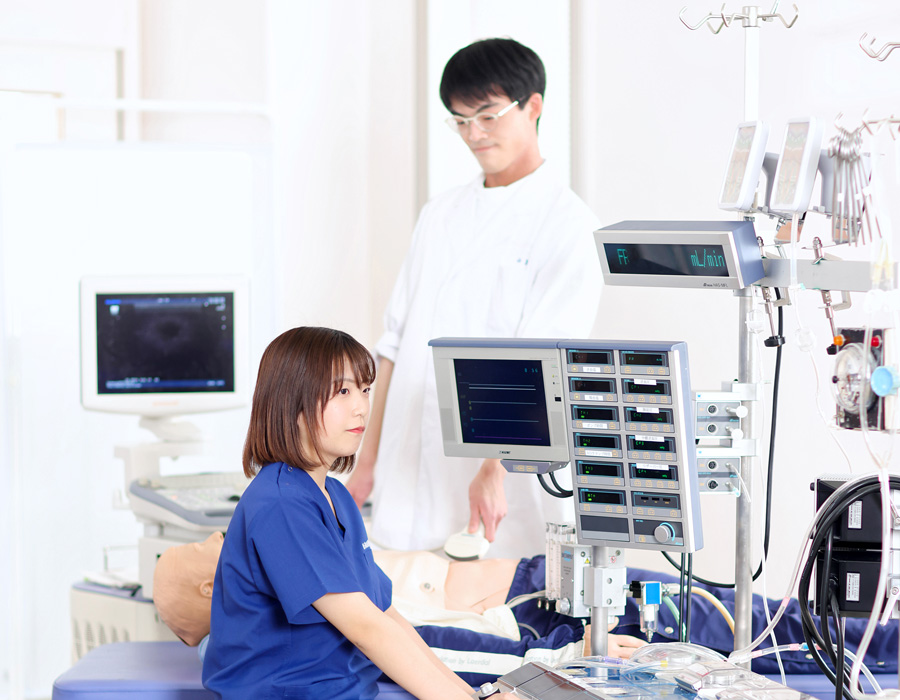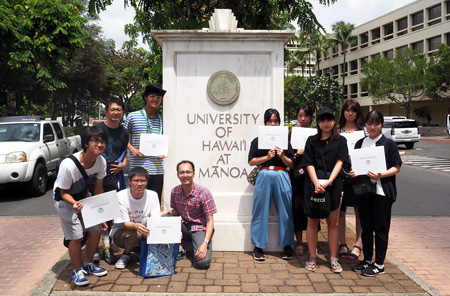
Objectives
The aim of our department is to educate students to become clinical engineers and medical technologists. We intend to develop a new type of specialists with double licenses: one for clinical engineers who operate life supporting devices and other for medical technologists who perform clinical examinations at a laboratory. We have a strong belief that in the near future this new type of specialists will play an important role in medical care.
Characteristics of the Curriculum
Our academic disciplines compose of compulsory subjects that can be completed in four years. In their first year, students take such subjects as introduction to medicine, electrical engineering, introduction to biomedical engineering, physiology, biochemistry, and anatomy. In their 2nd and 3rd years, they take special subjects such as mechanical engineering, material engineering, clinical hematology, clinical chemistry, clinical immunology, and so on. In their final year, they go out for clinical training to hospitals in order to acquire practical skills.
Qualification and Careers
We aim for the qualifications of the Certified National Clinical Engineers and the Certified National Medical Technologist. Prospective places of employment are many and vary greatly among: university hospitals, specialty hospitals, medical examination centers, food companies, pharmaceutical companies, medical equipment manufacturers, public health centers, public offices, educational institutions and research institutions.
International Activities
 We provide students with opportunities to meet clinical engineers and medical technologists in other countries. We especially aim to enhance their foreign-language skills through students’ exchanges.
We provide students with opportunities to meet clinical engineers and medical technologists in other countries. We especially aim to enhance their foreign-language skills through students’ exchanges.
Diploma, Curriculum and Admission Policies (Department of Clinical Engineering and Medical Technology)
| STEPS Abilities and attitudes of qualified QOL supporters |
Diploma Policy NUHW grants a bachelor's degree to the students who have acquired the following abilities and attributes. |
Curriculum Policy NUHW implements the curriculum as follows in order to help students develop into competent QOL supporters. |
Admission Policy NUHW seeks students who have the following abilities and attributes. |
|
|---|---|---|---|---|
| S | Science & Art Ability to utilize scientific knowledge and skills in academic discipline |
Abilities to utilize their advanced scientific knowledge and skills in clinical engineering and medical technology | Our curriculum of combined lessons for double natinal licences of clinical engineer and medical technologist, is set up. The outcome is evaluated based on the results of national and qualification examinations. | Basic academic skills and learning abilities of subjects, such as English, Japanese,Mathematics Physics, Biology, and Chemistry, at the high school graduation level |
| T | Teamwork & Leadership Ability to work together as a team and to show leadership qualities |
Abilities to demonstrate leadership for solving clients' problems in interprofessional collaborative practices | Our curriculum provides the lessons for clinical practices within and out the scool.The outcome is evaluated by the achievement of the relevant subujects and reports from the hospitals performing clinical practice according to the Rublick evaluation method. | Abilities to express and confer logically his/her own opinion and to reveal the leadership for constructing a team and reaching the goal of purpose |
| E | Empowerment Ability to support clients by giving them powers to promote QOL |
Attitude to be responsible for performing professional duties as clinical engineers and medical technologists in their interprofessional collaborative teams to promote clients' QOL with respect and support for their diverse backgrounds | Our curriculum provides lessens for clinical engineering and medical technology in paralell. The outcome is evaluated based on the acievement of the relevant subujects. | Ability to perform his/her lessons for study and extracurricular activities actively and subjectively |
| P | Problem-solving Ability to find ways of solving problems and propose better solutions |
Abilities to collaborate within their interdisciplinary teams to solve clients' problems based on scientific assessment in clinical engeneering and medical technology | Our curriculum provides the lessons for learning systematically the pathophysiology of several diseases and to obtain the technique for keeping medical equipments safely. The outcome is evaluated based on the achievement of the relevant subujects. | Abilities to incorporate others' opinions and to consider multilaterally in order to make a valid judgment on various issues |
| S | Self-actualization Attitude towards the fulfillment of his/her potential |
Attitude to maintain interests in advances in modern medicine to participate and contribute as part of their lifelong learning in medical technology | Our curriculum provides the lessens for obtaining two national(double)licences of clinical engineer and medical technologist. The outcome is evaluated based on the achievement of examinations for relevant subujects and the reports from the hospitals performing clincal practice, according to the Rublick evaluation method. | Abilities to maintain wide-ranging interests in issues of health, medicine, welfare, and sports, and to actively and willingly hold doble national licences for clinical engineering and medical technology |
| Remarks | Refer to University Regulations, Article 1 | Refer to School Manual(Gakusei Binran) | Refer to Guidelines for Applicants(GakuseiBoshu Yohko) | |
| Degree to be awarded | Bachelor of Clinical Engineering and Medical Technology | |||
Notes: "STEPS" is a acronym formed from the words, which represent "the five requirements" for qualified QOL supporters.NUHW stands for Niigata University of Health and Welfare.

